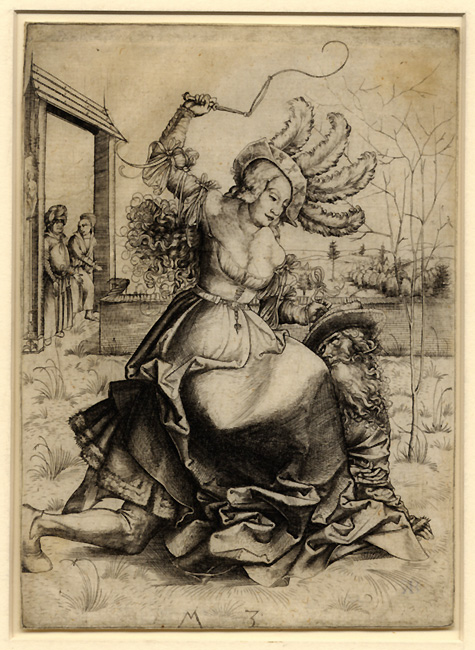Bizarre
- Lepic, Ce qui Restait du Puissant Guillaume de Naillac
- Claeaz, Dancers with Death
- Anonymous American, A Naked Man and Horse
- Klinger, Amor, Tod und Jenseits (Love, Death and the Hereafter)
- Surugue, La Folie pare la Décrépitude
- Legros, La Légende du Bonhomme Misère : La Mort dans le Poirier
- Rops, L’Enlèvement
- Sadeler, Allegory of Opulence, Fornication and Stupidity
- Mohlitz, La Vierge aux Étrons (The Virgin of Turds)
- Legrand, Épaves de Famille (Oddballs of the Family)
- Jacquemart, L’Écurueil (sic)
- Benassit, L’Absinthe!
- de Bry, Punishment of the Mutinous Indians
- Goncourt, Le Singe au Miroir (The Monkey at the Mirror)
- Callot, Les Martyrs du Japon
- Dillon, Les Mendiants (The Beggars)
- Barberis, The Witch
- Budzinski, The Thirsty Giant
- Meryon, Le Ministère de la Marine
- Torre-Bueno, Death’s Arrival
- van Meurs, Animals of America
- Redon, Félinerie
- Chagall, Le Vixe
- Martin, Indécision (Tête de Femme)
- Rops, Le Calvaire
- Rops, Les Frères de la Bonne Trogne
- Gillray, Tentanda via est qua ve quoque possim Tollere humo
- Underwood, Simian Ecstasy
- Veber, Beheaded!
- Strang, Death and the Ploughman’s Wife: Frontispiece
- Corman, The Temptation of Saint Anthony
- Bliss, Gargoyles Spouting
- Castellón, Of Land and Sea
- Eichenberg, Isaiah 11
- Rops, L’Idole (The Idol)
- Master MZ, Aristotle and Phyllis
- Bracquemond, “Hors de mon soleil, canailles!"
- Spare, Nemesis
- Higgens, Forgotten
- Anonymous, Jewish Amulet to Protect Mother and Child
- Daumier, Une Expérience Qui Réussit Trop Bien
- Seligmann, Le Roi du Charbon (King Charcoal)
- Braun, The Release of Force
- Callot, Le Grand Rocher
- Forest, Bâstard Foetus Hérédité, Comte D’Averton Mort-Né
- Jacque, La Souricière
- Veber, “Ah! Qu’il fait chaud"
- Pastelot, Les Sorcières
- Lepic, Le Verger du Roi Louis (The Orchard of King Louis)
- Grandville, Résurrection de la Censure
- Tidemann, The Earth Swallows Up the People of Korah
- Shields, The Descent
- Redon, C’est le diable
- Sadeler, Ita Erit et Aventus Filii Hominis
Aristotle and Phyllis
Engraving, ca. 1500, 179 x 130 mm., Bartsch 18, Lehrs 22. Ex collection: Bernhard Keller, (Lugt 384). A fine, early impression, sharp, clear and black in the deep shadows, on laid paper with an apparently unrecorded watermark of a small flower with two leaves. Lehrs estimates forty impressions extant of which only twenty are early. The sheet has been given an added narrow margin and 5 mm. at the top and 2 mm. at the top left have been restored, with the very top curve of the whip drawn in pen and ink; a tear at the left has been neatly repaired. What we have here in this incredibly rare print is the bizarre image of a courtesan astride a philosopher, whipping him like a horse. In medieval legend, Aristotle was the philosopher friend and tutor of Alexander the Great, and Phyllis, Alexander's favorite courtesan. Aristotle, in attempting to end the relationship, warned Alexander that women had often been the undoing of strong men. Phyllis, to gain revenge, aroused the passion of the philosopher and demanded, as proof of his love, that she be allowed to ride on his back as on a horse. The incident was witnessed by Alexander who learned thereby to distrust women, against whom even old philosophers were powerless. The story became an allegory of woman's domination of man, something that seems not to have changed much over the ages.
![]()
